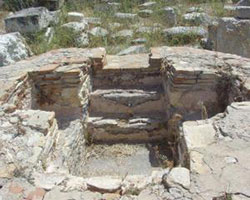
Gregory wanted to become a Christian. Part of that secret, underground group in this, one of the early centuries after Jesus. Gregory had been prepared over a period, but still didn’t know exactly what would happen this night.
There was fasting, praying, reading, singing all night…
Before dawn he was faced West and asked if he renounced the darkness, Satan, all evil. Gregory, not sure what exact words to say, just said yes.
He was turned to face the dawn beginning in the Easter morning…
Then, naked, Gregory was taken to stand in water.
Do you believe in, do you commit yourself to, do you trust in, God, the Father almighty,
creator of heaven and earth?
Gregory hesitates for a moment: “… ummm – yes.”
He is grabbed – dunked under the water. And held there. He feels he is drowning. Dying.
Gregory finally comes up coughing. Spluttering.
Do you believe in Jesus Christ, God’s only Son, our Lord,
who was conceived by the Holy Spirit,
born of the Virgin Mary,
suffered under Pontius Pilate,
was crucified, died, and was buried;
he descended to the dead.
On the third day he rose again;
he ascended into heaven,
is seated at the right hand of the Father,
and will come again
to judge the living and the dead?
“Yes!” He holds his nose. Under he goes again.
Gregory, do you believe in the Holy Spirit,
the holy catholic Church,
the communion of saints,
the forgiveness of sins,
the resurrection of the body,
and the life everlasting?
“Yes.” Under the third time.
So there you have the nascent Apostles’ Creed.
Ps. We tend to read “baptizing them in the name of the Father and of the Son and of the Holy Spirit,” as instructions for words to be used as a sort of incantation. And end up debating which incantation to use when it says, “be baptized every one of you in the name of Jesus Christ”. Or, “they were baptized in the name of the Lord Jesus.” Some then go to pronouncing the following over someone being baptised: “I baptise you in the name of the Lord Jesus Christ, even in the name of the Father and of the Son and of the Holy Spirit.” Furthermore identifying “Lord” with “Father”; “Jesus” with “Son”; and “Christ” with “Spirit”. When all the while the texts were using “in the name of” to mean “on behalf of” and “into the nature of” not in our contemporary incantation way at all – as our story above illustrates.
This is the third in a series:
The first is Apostles’ Creed.
The second is I believe in God.
If you appreciated this post, there are different ways to keep in touch with the community around this website: like the facebook page, follow twitter, use the RSS feed,…



The full immersion baptism is what the old fundamentalist churches have always done and is exactly how you say with the recitation of the Holy Trinity. At sixteen it was my first experience with the Holy Spirit entering my presence and the awe-inspiring act of my friend speaking in tongues next to me. It showed me what real faith means and why you should never stop believing.
Catholic Mass on TV Sunday said “descended into Hell” instead of what I’m used to hearing – descended to the dead. Really, Hell? I was kind of shocked actually – like I never heard that before.
If I can keep my series going, we will get to that line by and by. So – watch this space. Blessings.
Yes, that’s the way I’ve always heard it: “descended into Hell”. I’ve tried researching this online and asked a good friend of mine who is active in Bible study what this means but never really got a satisfactory answer.
If you could clear this up it would be great!
“on behalf of” and “into the nature of”
Thank you for this.
Thank you for this powerful post.
Can you tell me what your source was for this?
Thank You,
Craig
Thanks, Craig, for your encouragement. Not sure what you mean by “source” – I wrote it, otherwise I would have credited it. It is based on my reading of early church liturgies, instructions, homilies, and writings. Is that what you mean? Blessings.